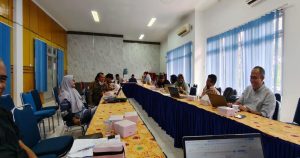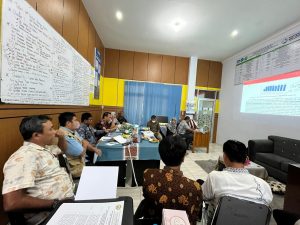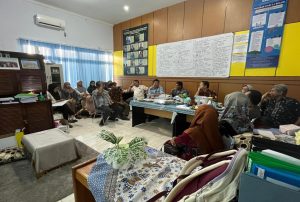
Preparing for Accreditation Visitation: Field Assessment Simulation for the Master’s Program in Biology, University of Bengkulu
The University of Bengkulu continues its efforts to enhance the quality of education, one of which is through the accreditation preparation of the Master’s Program in Biology, FMIPA. In preparation for the Field Assessment for the Accreditation of the Master’s Program in Biology, on Tuesday (18/02/25), various stakeholders conducted a Field Assessment Simulation led by the Coordinator of the Master’s Program in Biology, Dr. Risky Hadi Wibowo, M.Si, in the FMIPA Meeting Room, 2nd Floor.
This event was attended by the Dean and Vice Dean of FMIPA, the Head and Secretary of the Department of Biology, the Coordinator of the Master’s Program in Biology, the accreditation team, as well as lecturers and academic staff within the program. The simulation aimed to ensure that all aspects required for accreditation were well prepared.
The Dean of FMIPA, University of Bengkulu, Prof. Dr. Sal Prima Yudha, S., S.Si, M.Si, emphasized several key points in his directive, including:
- The Importance of LED Simulation
The Self-Evaluation Report (LED) simulation is a crucial step in accreditation preparation. The Dean requested that the Review Team provide input based on findings and evaluations of the LED compiled by the Study Program Management Unit (UPPS) and the Study Program to align with LAMSAMA’s assessment indicators.
- Optimization of Evidence and Supporting Documents
The Head and Secretary of the Department, as well as the Program Coordinator, were asked to ensure the availability of documents required during the Field Assessment. Empirical evidence related to the Tri Dharma activities of Higher Education—education and teaching, research, and community service must be optimally prepared.
- Refinement of Data and Activity Evidence
Any incomplete or non-compliant aspects with accreditation standards must be immediately addressed. Activity data from the university, faculty, department, and study program including academic activities, student affairs, financial management, and the outcomes of lecturers and students need to be improved and aligned with accreditation requirements.
Advanced Simulation for Accreditation: Strengthening Preparation with the Secretary of the Learning Development Division
Later in the same day, the afternoon session continued simulation for accreditation with the Secretary of the Learning Development Division of the University of Bengkulu, Dr. Gumono, S.Pd, M.Pd, also provided assistance. He offered constructive input on the accreditation documents prepared by UPPS and the Study Program. This assistance greatly helped refine the preparation for the field assessment. The accreditation of the Master’s Program in Biology, University of Bengkulu, will be conducted in collaboration with the Independent Accreditation Institute for Natural Sciences and Formal Sciences (LAMSAMA). With thorough preparation through this simulation, it is hoped that the Master’s Program in Biology will achieve optimal accreditation results, thereby further enhancing educational quality and the competitiveness of graduates at both national and international levels. The Dean of FMIPA also expressed appreciation and gratitude to all parties involved in the accreditation process. Strong synergy and collaboration are expected to help the Master’s Program in Biology, University of Bengkulu, achieve the highest educational standards.


